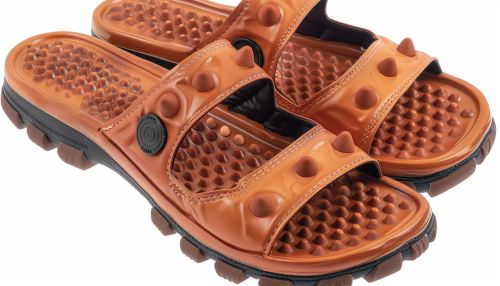Reflexology Self-Massage Sandals
Introduction
Reflexology self-massage sandals are a type of footwear designed to stimulate pressure points on the foot. These sandals are based on the principles of reflexology, a form of alternative medicine that involves applying pressure to specific points on the feet, hands, and ears. The underlying theory behind reflexology is that these areas correspond to different organs and systems of the body, and that pressing them can have a beneficial effect on a person's health and wellbeing.


History
The concept of reflexology has been around for thousands of years, with evidence of its practice found in ancient cultures such as Egypt, China, and India. However, the modern practice of reflexology as we know it today began in the early 20th century with the work of Dr. William Fitzgerald, an American ear, nose, and throat specialist. Fitzgerald developed the theory of "zone therapy," which proposed that the body could be divided into ten vertical zones, with each zone corresponding to different parts of the body.
The development of reflexology self-massage sandals is a more recent innovation, designed to allow individuals to practice reflexology on themselves. These sandals typically feature raised bumps or nodules on the insole, which are positioned to stimulate the various reflex points on the foot as the wearer walks.
Design and Function
Reflexology self-massage sandals are designed with the principles of reflexology in mind. The insole of the sandal features a variety of raised bumps or nodules, each of which is designed to stimulate a specific reflex point on the foot. The placement of these nodules is based on a reflexology map, which shows the areas of the foot that correspond to different organs and systems of the body.
When a person walks while wearing these sandals, the nodules apply pressure to the reflex points on the foot. This is believed to stimulate the corresponding organs and systems, potentially leading to a range of health benefits. Some of the potential benefits of reflexology include stress reduction, improved circulation, and enhanced overall wellbeing.
Potential Benefits
While the scientific evidence supporting the effectiveness of reflexology is limited, many people who use reflexology self-massage sandals report experiencing a range of benefits. These can include:
- Stress reduction: Reflexology is often used as a form of stress management. The act of massaging the feet can be relaxing, and many people find that it helps to reduce feelings of stress and anxiety.
- Improved circulation: Some proponents of reflexology believe that it can help to improve blood flow and circulation. This can potentially lead to improved organ function and overall health.
- Pain relief: Some people use reflexology as a form of pain management. The theory is that stimulating certain reflex points can help to alleviate pain in other parts of the body.
- Enhanced wellbeing: Many users of reflexology self-massage sandals report feeling a general sense of improved wellbeing after using the sandals. This can include feelings of relaxation, improved sleep, and enhanced mood.
Criticisms and Controversies
Despite its popularity, reflexology and by extension reflexology self-massage sandals, have been the subject of criticism and controversy. The main criticism is that there is a lack of scientific evidence to support the claims made by proponents of reflexology. While some studies have found that reflexology can help to reduce stress and anxiety, these studies are often small and poorly designed, making it difficult to draw definitive conclusions.
In addition, some critics argue that the concept of reflexology is based on a misunderstanding of anatomy and physiology. They point out that there is no scientific evidence to support the idea that specific areas of the foot correspond to different organs and systems of the body.
Despite these criticisms, many people continue to use reflexology self-massage sandals and report positive experiences. It is important for individuals to make informed decisions about their health and wellbeing, and to consult with a healthcare professional if they have any concerns.
